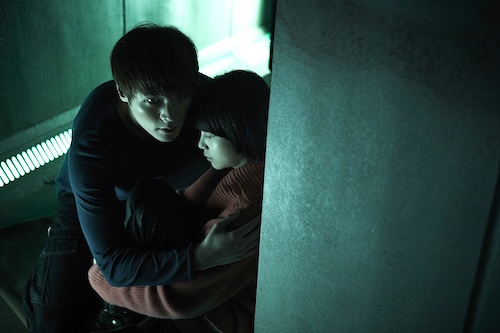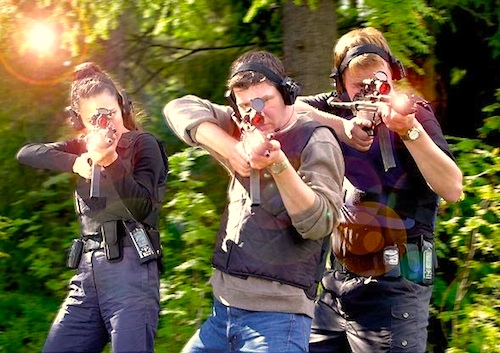By Joe Bendel. Think of it as the less noir version of Naked City with its eight million stories. Dave Isay founded StoryCorps in the belief that there were real life stories out there from everyday people that deserved to be recorded for posterity. For ten years, StoryCorps crews have collected oral histories across the country. Sometimes the stories were funny and sometimes poignant, but their inherent drama has become a source of constant inspiration for the Rauch Brothers. Their short animated adaptations of StoryCorps transcripts have become staples of short film festivals and have regularly been peppered throughout seasons of POV. Fittingly for Thanksgiving and the first day of Hanukkah, POV will premiere its first ever animated special, Mike & Tim Rauch’s Listening is an Act of Love on PBS stations nationwide.
As a wrap-around framing device, Isay’s young nephew Benji interviews his uncle to find out just why he does all this anyway. He has a memorable answer that nicely establishes the theme of Listening: family. The POV special includes four new stories, but begins and ends with two old favorites—and it is not hard to understand why those two struck such a chord with audiences. In the gleefully funny Miss Devine, two cousins swap memories of the titular Sunday School teacher who was a stern, unyielding presence during their summer vacations. Both James Ransom and Cherie Johnson are natural storytellers and the way they crack each other up is appealingly infectious.
 Things get more serious and more family-focused during Listening’s debuts, starting with Making It, a simple but inspiring story of the American dream. On the eve of becoming the first in his family to go to college, Noe Rueda reflects on the difficult jobs he held to help his single mother make ends meet. It is probably the most touching segment of the POV segment, even if it is somewhat open-ended. The following Marking the Distance tells the story of a brain tumor survivor, who lost her short term memory, but has since become an accomplished marathoner thanks to the support of a boyfriend. It is a nice, feel-good story, but perhaps the least distinctive of the special.
Things get more serious and more family-focused during Listening’s debuts, starting with Making It, a simple but inspiring story of the American dream. On the eve of becoming the first in his family to go to college, Noe Rueda reflects on the difficult jobs he held to help his single mother make ends meet. It is probably the most touching segment of the POV segment, even if it is somewhat open-ended. The following Marking the Distance tells the story of a brain tumor survivor, who lost her short term memory, but has since become an accomplished marathoner thanks to the support of a boyfriend. It is a nice, feel-good story, but perhaps the least distinctive of the special.
Arguably, The Road Home gives Listening its greatest emotional pop. Eddie Lanier tells his story of how he went from being the privileged son of a prominent North Carolina mayor to a skid row drunk, until a good Christian Samaritan took him into his home. Wider in scope than the rest of the special, Lanier’s unabashedly redemptive story would be perfect for a Hallmark original film. There is also unexpected power in the twist to the tale Jackie Miller tells her adopted son Scott in Me & You, which has something for pro-life viewers and fans of Modern Family, alike.
Listening concludes with an encore appearance of No More Questions! Kay Wang was not one to suffer fools gladly, but her son Cheng and granddaughter Chen had learned to appreciate her forceful personality. Somehow, they managed to get her to sit for a StoryCorps session, laughing their way through her uncooperative responses that so aptly reflected her personality. In fact, they are probably rather glad it turned out that way in retrospect, judging from the bittersweet postscript.
The Rauch Brothers have a real facility for matching the expressions of their animated figures to the recorded interviews. In fact, they have been known to nail the likenesses and mannerisms of the speakers without having anything to model them on, besides their spoken words. Frankly, it is always reassuring to see a StoryCorps film in a festival’s shorts programming block, because of the Rauch Brothers’ commitment to quality. Recommended for post-turkey family viewing, Listening is an Act of Love airs on most PBS outlets this Thursday night (11/28) as part of the current season of POV.
LFM GRADE: B
Posted on November 26th, 2013 at 2:31pm.


